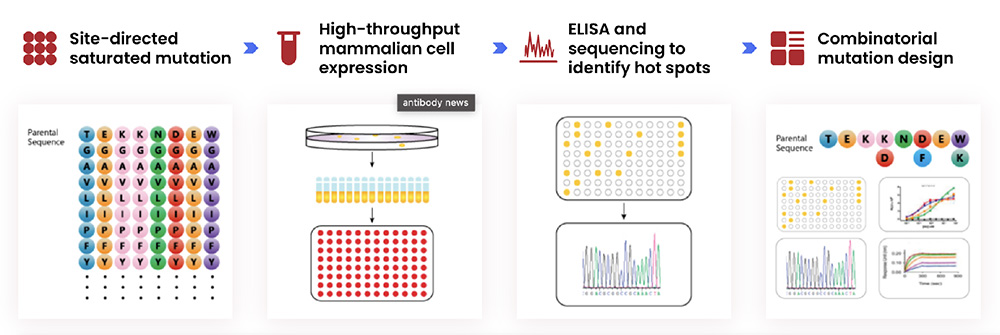Affinity maturation refers to the process of improving antibody affinity and binding interactions to target antigens. This is done naturally in vivo by somatic hypermutation and clonal selection in mammalian B cells, but it can also be done in the lab in vitro by mutagenesis and selection for therapeutic applications.
In vivo
When a host is repeatedly exposed to the same antigen, the antibodies produced by their immune response will have increasingly greater affinity, avidity, and anti-pathogen activity. This occurs due to somatic hypermutation in the variable CDRs (complementarity-determining regions) of immunoglobulin genes in B cells, and takes place in germinal centers (structures within secondary lymphoid tissues). Clonal selection takes place when follicular dendritic cells of the germinal centers present antigens to the B cells, with only the most competitive B cells surviving to stably conjugate with follicular B helper T cells. After several rounds of selection, high-affinity antibodies will be produced.1
In vitro
Similar to the in vivo process, in vitro affinity maturation is used to optimize antibodies, antibody fragments, or other peptides by diversifying the antibody base sequence and isolating higher-affinity binders.
FCMES-AM™ (Full Coverage Mammalian Expression System for Affinity Maturation) is Biointron’s proprietary platform for affinity maturation. Each amino acid in the CDR region will be mutated to the other 17 amino acids (except Cysteine and Methionine) with equal ratios. The clones will be expressed in a mammalian system, and an ELISA binding assay will be conducted as an initial test. This will be followed by SPR (surface plasmon resonance) or FACS (fluorescence-activated cell sorting) for further affinity measurements.The process is as follows:
- Site-directed saturated mutation
- High-throughput mammalian cell expression
- ELISA and sequencing to identify hot spots
- Combinatorial mutation design and characterization
we are dedicated to accelerating antibody discovery, optimization, and production. Our advantages in affinity maturation include:
- No-bias Site Saturation Mutagenesis in CDR Regions
- Guaranteed at least 5-fold Affinity Improvement
Our team of experts can provide customized solutions that meet your specific research needs. Contact us to learn more about our services and how we can help accelerate your research and drug development projects.
- Doria-Rose, N. A., & Joyce, M. G. (2015). Strategies to guide the antibody affinity maturation process. Current Opinion in Virology, 11, 137. https://doi.org/10.1016/j.coviro.2015.04.002

